Your first trip to the veterinarian with your Brussels Griffon will probably involve vaccinations to prevent him from contracting any number of common diseases, such as distemper and parvovirus.
For the first eight weeks of life, the Griffon puppy is safe from disease thanks to the immunization he received from his mother by nursing.
In the first two days, he ingests not milk but colostrum, a special secretion of the mammary glands that contains antibodies, vitamins, and minerals. It supplies essential immunity to the puppy and aids in the establishment of the intestinal function.
But as that wears off, vaccination is needed to boost the immune system’s strength. Puppies generally receive three or four sets of vaccinations about once a month until they are four or five months old. At that point, the Griffon’s system is mature enough to create immunity that can get him through a year.
One year from his last puppy shot, the yearling goes back to the veterinarian for vaccinations to ensure his continued immunity to common diseases.
After that first year, there is substantial debate in the veterinary community about whether or not a dog needs annual booster shots. Most vets recommend them.
But recent long-term studies show that older dogs maintain antibodies for many years after just one vaccination, as human children do with just one vaccination against polio, diphtheria, measles, or smallpox.
 Vaccines are made from the same germs, that cause disease. When the weakened or killed germs are introduced into the dog’s body, usually by injection, the immune system reacts to the vaccine the same way it would if it were being invaded by the disease: it makes antibodies.
Vaccines are made from the same germs, that cause disease. When the weakened or killed germs are introduced into the dog’s body, usually by injection, the immune system reacts to the vaccine the same way it would if it were being invaded by the disease: it makes antibodies.
The antibodies destroy the vaccine germs just as they would the disease germs. They remain in the dog’s body to protect him if he is ever exposed to the real disease.
Most veterinarians give “combination vaccines” – multiple vaccines given in a single shot. Some owners worry that it is not safe to give several shots at once, or that they may not work as well, or that they will overload the dog’s system.
But studies have shown that vaccinations are safe and effective when given together. The immune system is exposed to many foreign substances every day, and deals with all of them.
Shots are very safe, but they are not perfect. Like any other medicine they can occasionally cause reactions. Common side effects include soreness and redness at the injection site. Fever and muscle aches can occur. A severe reaction of anaphylaxis, or shock, is rare, but it does happen.
Wait twenty minutes after a vaccination shot before leaving the vet’s office, because if a puppy does have an anaphylactic reaction, he is quickly restored by an injection of epinephrine.
Heartworm
Heartworm is a potential problem in most areas of the United States. But preventing it is easy with a daily or monthly treatment of ivermectin. In northern states, veterinarians often recommend using heartworm pills for the summer months and testing the dog every spring before starting the medication again.
In warm climates, dogs stay on heartworm medication year round. It’s important to keep dogs protected against this possibly deadly parasite.
Fleas and Ticks
With the new treatments available, fleas can be banished from your dog and your home. Dogs are treated monthly with a drop of medication between the shoulder blades. This effectively kills off the fleas.
Ticks are a more difficult problem. If you live in a tick-prone area, you need to check your dog every day and remove any ticks from his skin. The most dangerous ones are deer ticks, tiny insects that can carry Lyme disease.
Take a pencil and make a dot on white paper; that’s how big a deer tick is. You can’t see it or feel it on your dog. Your veterinarian will know if there are Lyme disease-bearing ticks in your area.
He may recommend vaccinating your Brussels Griffon against this illness. You also might consider having your trees treated to keep ticks away.

